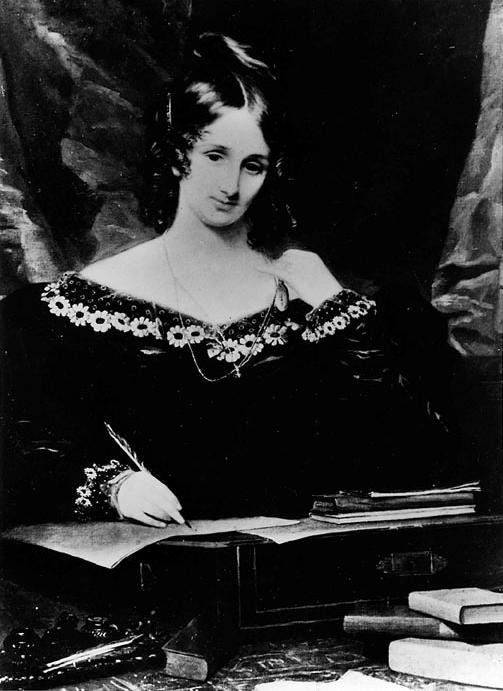Over the course of my life and career, I have heard various iterations of "Father of” xyz discipline: William Halstead, father of modern surgery.1 Marion Sims, father of gynecology.2 And Jules Verne is often regarded as the father of science fiction, despite Frankenstein having been published before Verne was even born.
So I'd like to propose a new moniker: Mary Shelley, the mother of speculative fiction.

Mary Wollstonecraft Godwin Shelley's life, her pain, suffering and heartbreak, have entered the cultural consciousness to the point that we have begun to mythologize it. Who has not, at some time, heard of the infamous trip to Lake Como, the cabin where ghost stories were told, which led ultimately to the creation of Frankenstein?
Frankenstein is one of those rare classics that is inspired by and closely tied to the ideas and scientific discoveries of its own time, yet remains relevant decades, and centuries later. It can be read through a myriad of lenses, spanning from the struggles of motherhood and gender, to ethical limitations in medicine and scientific advancement, to religious allegory, to an explanation of the Enlightenment.
A few years after Frankenstein was published, she wrote The Last Man, a post-apocalyptic story set between 2073 to 2100, in which the protagonist, Lionel Verney, witnesses a pandemic so deadly that it seemingly kills every human on Earth, except for him. The book is concerned with human beings' preoccupation with themselves, showing how the planet's continual change and growth occurs in the absence of humans. But it also explores and expands on ideas of loneliness, and the yearning, sadness, and, occasionally, hope that come with it.
Shelley was perhaps not the first to write an imaginative book - others cite The Chemical Wedding, by Johann Valentin Andreae, published in 1616, or Thomas More's Utopia published in 1516. The former involves a fantastical journey and plot points that revolve around alchemy, while More's Utopia imagines an imaginary perfect island where all denizens are equal, and live in peace and harmony. But I would argue that these books function more as allegories than fully fleshed -out stories of their own right.
With the world having gone through the Enlightenment, Romanticism, and Naturalism movements by the time Shelley started writing, her books were among the first to truly imagine new worlds that went one step beyond allegory and religion, that spoke to individual people, and commented on core aspects of humanity.
In 1833, Shelley wrote a short story called The Mortal Immortal which tells the tale of a man, Winzy, who drinks an elixir that makes him immortal — as one might imagine, this doesn’t go exactly as planned. Once he starts to realize that everyone he loves will die around him, he is subject to a slow, endless psychological torture. The story has been linked to St. Leon, a 1799 novel by her father, William Godwin, in which an immortal protagonist with exceptional powers is unable to wield them successfully. But Shelley put her own twist on the idea, making her protagonist become immortal by accident. This reminds me of another literary giant: Shakespeare — he, too, frequently took existing tales, histories, and folklore, and added his own spin, incorporating his own insight into human nature and relationships.
My own personal relationship with Shelley has been brief, and mostly theoretical; I read Frankenstein as a teenager, and thought it was just okay. I can’t wait to revisit the book with a few more years, and many more thoughts under my belt.
If you're intrigued by the worlds of speculative fiction, be sure to check out our latest episode in which we discuss the different works of speculative fiction we've read over the past few months, discuss the realistic vs. genre debate, and share some recommendations for your TBR:
Further reading:
A Woman Out of Time: Rebecca Solnit on Mary Shelley’s Dystopian Sci-Fi Novel The Last Man [Lithub]
How a Volcano Birthed a Monster by
While brilliant, William Halstead was probably responsible for the brutal and often inhumane conditions that current medical (and particularly surgical) residents work through, because Halstead spent most of his life and working hours hopped up on cocaine. Read more here





How insightful. Thanks for sharing!
Loved this piece and Mary Shelley is so deserving of that title! Thank you for the shout out! <3